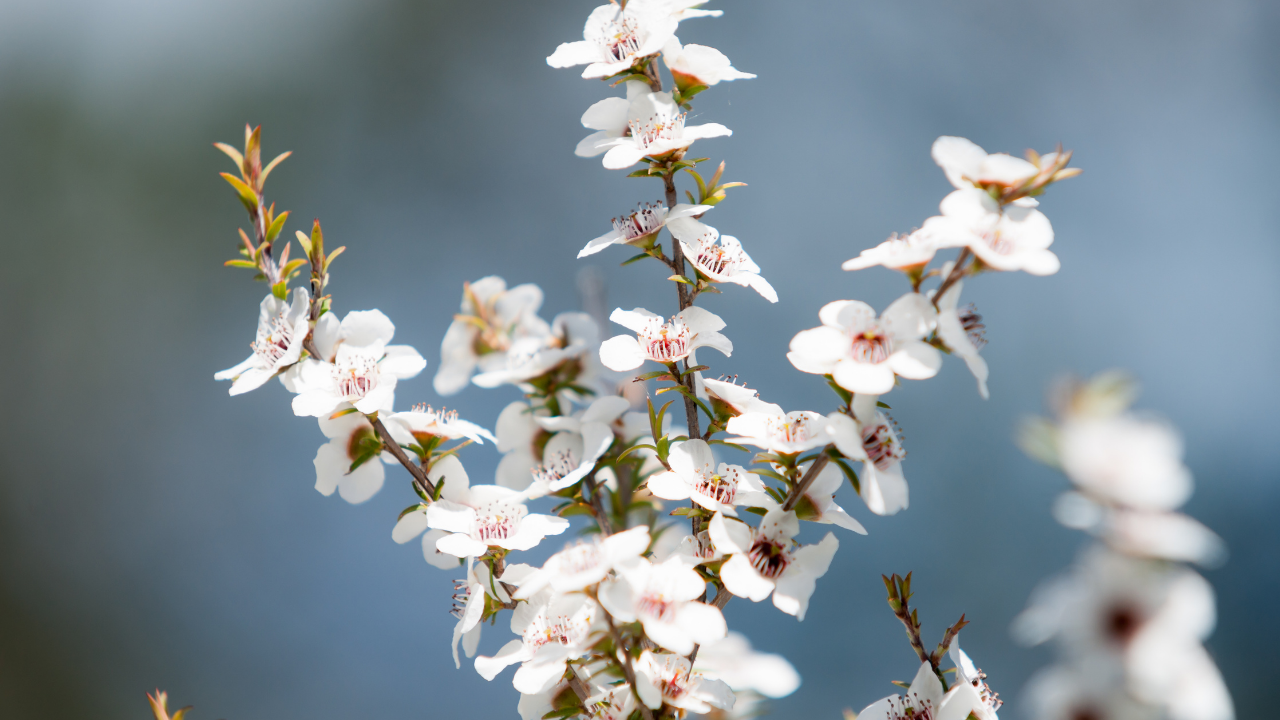Essential Oil Profile: Manuka, 'Leptospermum scoparium'

What is the first thing you thought about when you saw the word manuka? Manuka honey, perhaps? Although manuka honey has many health benefits, it often overshadows the amazing properties of manuka essential oil.
Manuka, sometimes referred to as New Zealand Tea Tree, actually has many of the same benefits as Australian tea tree essential oil.
Manuka is a small evergreen tree which grows to a height of 2.5–4.5 m (7–15 ft). It is indigenous to the North, South, and Stewart Islands of New Zealand. The flowers only bloom for 6–12 weeks each summer, depending upon the weather and location. Its small, rigid leaves are very fragrant and end in a short, sharp tip. Its bark is smooth and dark brown, and it peels off of the tree in strips. The manuka tree grows so prolifically that in some regions it is considered an invasive species.
The leaves of the manuka tree are fragrant because they contain the volatile organic compounds which are steam distilled to create manuka essential oil. But, before we talk about the benefits of the essential oil, let us take a little journey to discover the history of the tree.
The Manuka Tree: A Brief History
The Māori people are the Indigenous people of New Zealand. They traveled to New Zealand from eastern Polynesia around the year 1280 AD (MAORI - over 15 facts with links to more, n.d.). They referred to manuka as a taonga or “treasure.”
The leaves of the manuka tree have been traditionally boiled and used by the Māori people as a preparation to reduce fever, alleviate congestion, reduce muscular pain, treat gum disease, and soothe burns.
Captain Cook (1777) instructed his crew to drink a brew made of Leptospermum scoparium to prevent scurvy.
Manuka seeds were ground and applied to wounds. The wood of the Manuka tree is strong and flexible, and was used for building canoes, oars, weapons, spears, and building huts. The bark, which is waterproof, was used for the roofs of the huts. The wood was also used in smokehouses to add flavour to fish and meats.
Manuka Essential Oil: Composition and Therapeutic Actions
The chemical constituents in manuka essential oil can vary depending upon geography, and these variations are denoted as chemotypes. Manuka from the North Island, especially from the East Coast region, is higher in leptospermone (<30%) and flavesone, while essential oils from the South Island contain higher percentages (65%) of sesquiterpenes and sesquiterpenoids (Rhind, 2019).
Manuka essential oil has an affinity for several body systems:
Integumentary System
- antifungal
- antipruritic (reduces itching)
- antiphlogistic/cicatrisant (issues such as dermatitis or mild sunburn)
- anti-seborrheic (acne)
- antiviral (cold sores)
- dandruff
- insecticide
- vulnerary (cuts/abrasions)
Respiratory System
- antitussive
- anti-inflammatory
- decongestant
- expectorant/mucolytic
- respiratory tract infections
Immune System
- antimicrobial
- germicidal
- antiviral (colds, flu, rhinitis)
According to Tisserand and Young (2014), there are no contraindications associated with manuka essential oil.
I visited the beautiful country of New Zealand in 2018 and brought home some manuka essential oil and some manuka honey — both of which are long gone. I think I’ll need to plan another trip to stock up!
Manuka essential oil is covered in depth in our Certified Master Aromatherapist Program, which prepares you to become an aromatherapy consultant, launch a product line or retail business, teach workshops, or provide services as an adjunct to your existing holistic health specialization.
Does this post inspire you to use manuka essential oil? Share your ideas or questions in the comments!
References
(n.d.). MAORI - over 15 facts with links to more. https://maorisource.com/
Rhind, J. P. (2019). Essential oils (Fully revised and updated): A comprehensive handbook for aromatic therapy (3rd ed.). Singing Dragon.
Tisserand, R., & Young, R. (2014). Essential oil safety: a guide for health care professionals. Churchill Livingstone.

Article by: Colleen Thompson, RA, MIFPA
For over 25 years, Colleen Thompson has been a passionate and highly respected aromatherapy educator. She has owned 3 aromatherapy stores and a holistic spa, and she founded Essence of Thyme in 1995, where she mentors budding aromatherapists from all over the world, helping them create their own thriving aromatherapy businesses.
About Essence of Thyme College of Holistic Studies
Essence of Thyme College of Holistic Studies offers 300- and 630-hour professional aromatherapy certification programs that help you grow a successful, fulfilling career by specializing and creating your market niche. Professional Level Certification prepares graduates to become aromatherapy consultants, launch product lines or retail businesses, or provide services as an adjunct to existing holistic health specializations. Master Level Certification and electives are ideal for certified aromatherapists seeking higher education or a path to clinical aromatherapy practice.
All Essence of Thyme programs focus on aromatherapy product development and advanced formulation, evidence-based research, spa and business management, international industry regulatory guidelines, and sustainability and conservation of essential oil and carrier oil-bearing plants.
Our comprehensive, evidence-based programs meet or exceed the criteria set forth by 5 international professional aromatherapy associations. Learn more about our aromatherapy certification programs.


